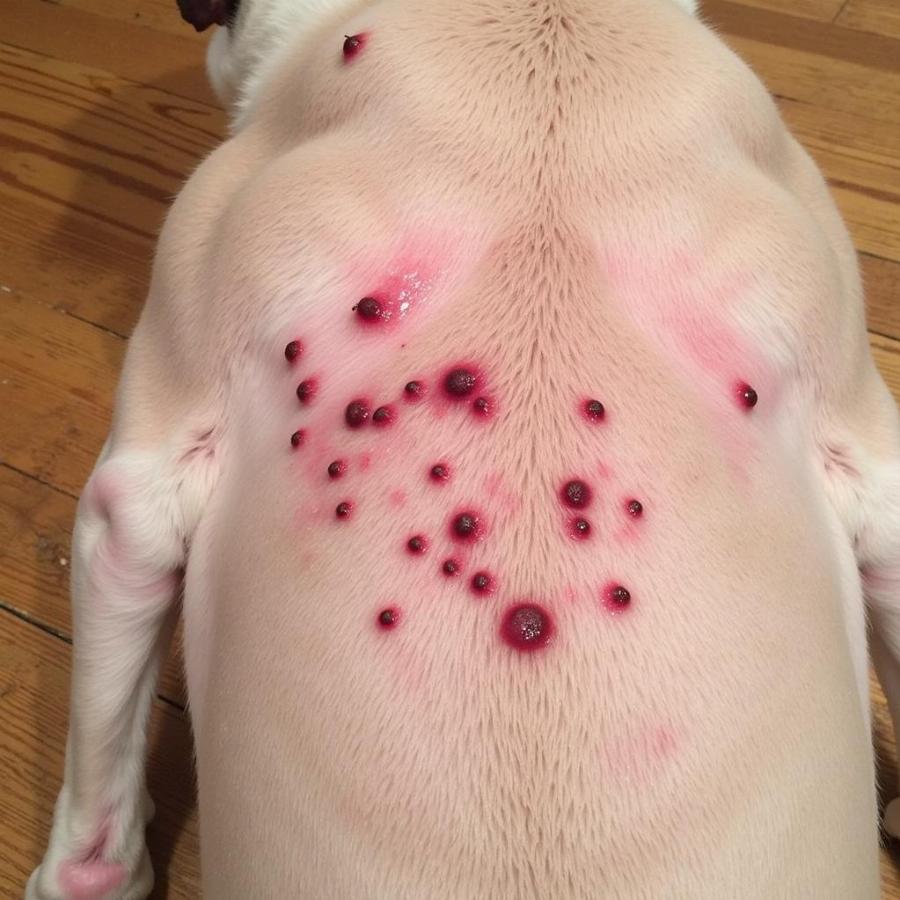As a responsible dog owner, you’re probably always on the lookout for your furry friend’s well-being. You keep them well-fed, groomed, and up-to-date on their vaccinations. But are you familiar with the different types of bug bites that can affect dogs?
Insect bites are a common occurrence in dogs, especially during warmer months when they spend more time outdoors. While some bites might be harmless and cause only minor irritation, others can transmit diseases or trigger severe allergic reactions. This article will cover everything you need to know about dog bug bites, from identification and treatment to prevention strategies.
Identifying Common Dog Bug Bites
Recognizing the type of bug bite on your dog can be challenging, but it’s crucial for determining the appropriate treatment. Here’s a closer look at some common culprits:
1. Fleas: The Tiny Terrorists
Fleas are tiny, dark-brown insects that thrive in warm, humid environments. They feed on the blood of animals, and their bites often appear as small, red, raised dots, usually clustered together.
Expert Insight: Dr. Emily Parker, a veterinarian with over 15 years of experience, emphasizes, “Fleas are notorious for causing intense itching in dogs. You might notice your dog excessively scratching, biting, or licking at the bite area.”
 Flea Bites on Dog's Belly
Flea Bites on Dog's Belly
2. Ticks: The Silent Threat
Ticks are small, parasitic arachnids that latch onto their host’s skin to feed on blood. They can vary in size and color depending on the species and whether they’re engorged with blood. Tick bites themselves are usually painless but can transmit serious diseases like Lyme disease.
Expert Tip: “When checking your dog for ticks, pay close attention to areas like the head, neck, ears, and paws,” advises Dr. Parker. “Ticks prefer to attach themselves to warm, moist areas.”
3. Mosquitoes: More Than Just a Nuisance
Just like humans, mosquitoes can be a nuisance for dogs too. While most mosquito bites cause temporary itching and swelling, some mosquito species can transmit heartworm disease, a potentially fatal condition.
Did you know? Mosquitoes are attracted to stagnant water. Regularly changing your dog’s water bowl and eliminating any standing water in your yard can help reduce mosquito populations.
4. Spider Bites: A Cause for Concern
Most spider bites are harmless to dogs, but some species, like black widows and brown recluses, can inject venom that causes severe reactions. These bites might appear as red, swollen areas with a pale center, often accompanied by pain, swelling, and even muscle cramps.
Important Note: If you suspect your dog has been bitten by a venomous spider, seek immediate veterinary attention.
When to Worry: Signs of an Allergic Reaction
While some itching and redness are normal after a bug bite, an allergic reaction requires immediate veterinary care. Watch out for these signs:
- Severe itching, scratching, or biting at the bite area
- Facial swelling, especially around the muzzle and eyes
- Difficulty breathing or wheezing
- Hives or welts appearing on the skin
- Vomiting or diarrhea
- Lethargy or collapse
Preventing Bug Bites: Protecting Your Furry Friend
Prevention is always better than cure, especially when it comes to bug bites. Here are some practical tips to safeguard your dog:
- Maintain a Regular Flea and Tick Prevention Routine: Consult your veterinarian for the most effective flea and tick preventives for your dog, considering their lifestyle and risk factors.
- Keep Your Yard Tidy: Trim your lawn regularly, remove debris, and avoid letting your dog roam in tall grass or wooded areas where ticks thrive.
- Check Your Dog After Outings: After walks in parks, forests, or tall grass, thoroughly inspect your dog’s fur for any signs of ticks or other insects.
- Consider Natural Repellents: Some natural oils, like citronella, eucalyptus, and lemongrass, can deter insects. However, always consult your veterinarian before using essential oils on your dog, as some can be toxic.
Beaut Dogs: Your Trusted Partner in Dog Care
Beaut Dogs is your one-stop resource for all things dog-related, offering credible and insightful information about the canine world. We provide comprehensive guides on breed characteristics, training tips, health advice, and much more to empower dog owners with the knowledge to provide the best possible care for their furry companions. For personalized guidance and expert advice, reach out to us at [email protected]. Let Beaut Dogs be your trusted partner in your dog parenting journey!